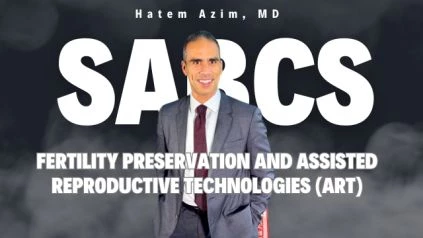By: Hatem Azim, MD
Date. 12/08/2023
At SABCS 2023, a discussion on fertility preservation and assisted reproductive technologies in breast cancer patients interrupting endocrine therapy to attempt pregnancy. The speaker for this session was Hatem Azim, MD, a medical doctor, medical oncologist, and adjunct professor at the School of Medicine of the Monterey Institute of Technology. Additionally, Hatem Azim holds the position of Senior Oncology Faculty at the College of the European School of Oncology.
Opening the conversation, Allen Wilbanks acknowledged Hatem Azim’s expertise and expressed gratitude for his presence in the discussion. Hatem Azim delved into the key findings from the positive trial presented at SABCS 2023, focusing on the safety and efficacy of interrupting endocrine therapy for pregnancy attempts in hormone receptor-positive, HER2-negative breast cancer patients.
Hatem Azim provided a thorough overview of the primary and secondary analyses of the positive trial, emphasizing the absence of an increased risk of recurrence associated with temporary interruption of endocrine therapy. He further presented insights into menstruation recovery patterns and the utilization of assisted reproductive technologies, exploring their impact on pregnancy success and potential risks.
As the discussion progressed, Allen Wilbanks sought guidance on the recommended duration and timing of endocrine therapy interruption to optimize pregnancy success while minimizing recurrence. Hatem Azim highlighted that, based on the trial, a temporary interruption after a minimum of 18 months and no more than 30 months of endocrine therapy was found to be feasible. He recommended a minimum of one and a half years of endocrine therapy before discussing temporary interruption in routine practice.
The conversation expanded to the specific role of assisted reproductive technologies in achieving pregnancy in this patient population. Hatem Azim outlined various techniques used in the trial, with a focus on cryopreserved embryos. He emphasized the higher odds of achieving pregnancy for those using cryopreserved embryos and underscored the importance of early counseling for fertility preservation, particularly in women above the age of 35.
Addressing concerns for breast cancer patients who conceive after endocrine therapy interruption, the discussion touched upon monitoring and management strategies during pregnancy and postpartum. Hatem Azim clarified that there was no specific governing schema for follow-up during pregnancy, but regular breast cancer follow-ups and fetal monitoring were recommended.
In concluding the interview, Allen Wilbanks sought Hatem Azim’s insights on counseling and supporting breast cancer patients desiring pregnancy. Hatem Azim emphasized the reassuring evidence provided by the data on the feasibility and safety of fertility preservation and assisted reproduction. He stressed the importance of attempting fertility preservation early in the treatment journey, before the initiation of standard therapies like chemotherapy.
Overall, Hatem Azim’s expertise and insights at SABCS 2023 contributed significantly to the understanding of fertility preservation options, endocrine therapy interruption strategies, and the nuanced considerations for breast cancer patients seeking pregnancy.

